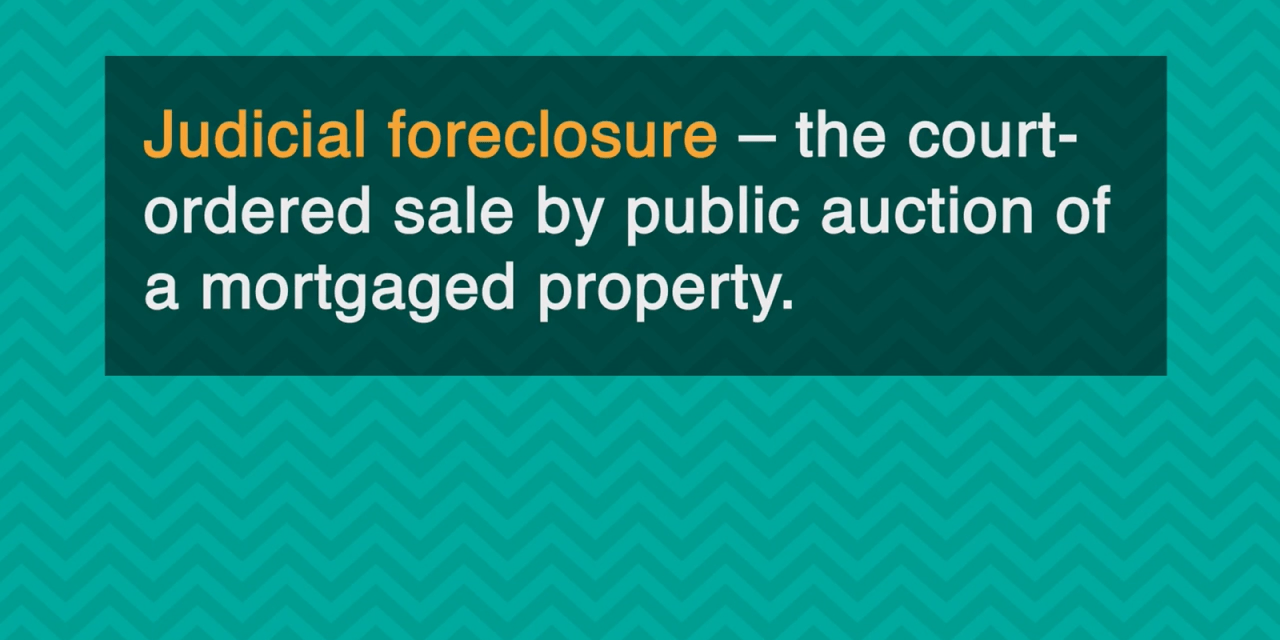What is a judicial foreclosure?
When a mortgage is in default, the mortgage holder’s collection efforts are limited to judicial or non-judicial activities. If the note evidences a recourse debt, the mortgage holder may recover against both the property and the named borrower.
To initiate either type of collection effort, the mortgage holder needs to first exhaust the security by foreclosing on the underlying real estate. The mortgage holder’s security interest in the property is exhausted when the mortgage holder completes a foreclosure sale on the property.
Only when the note evidences a recourse debt may the mortgage holder pursue a money judgment against the borrower for any deficiency in the property’s value to fully satisfy the debt. [Calif. Code of Civil Procedure §726]
Foreclosure is an activity comprised of notices and an auction to sell real estate. Foreclosure of the property eliminates the right of redemption held by the owner and any persons holding junior interests in the property.
A trust deed holder may foreclose on a property in one of two ways:
- judicial foreclosure, under mortgage law, also called a sheriff’s sale [CCP §725a]; or
- nonjudicial foreclosure, under the power-of-sale provision in the trust deed, also called a trustee’s sale. [Calif. Civil Code §2924].
Judicial foreclosure v. nonjudicial foreclosure
Judicial foreclosure is the court-ordered sale by public auction of the mortgaged property. The process can last anywhere from eight months to multiple years before it is completed.
Alternatively, when a trust deed holder nonjudicially forecloses by a trustee’s sale, the property is sold as authorized by the trust deed provisions at a public auction. Trustee’s sales are less expensive and quicker than judicial foreclosures and significantly more common in California.
A judicial sale requires the filing of a lawsuit, which includes:
- litigation expenses;
- appraisals; and
- attorney fees.
However, when the value of a secured property drops below the balance owed on recourse debt, the mortgage holder may elect to foreclosure by judicial action. A judicial foreclosure is the only foreclosure method which allows a mortgage holder to obtain a money judgment against the borrower for any deficiency in the value of the secured property to fully satisfy a recourse debt. [CCP §580d]
Suing to foreclose
The first step in a judicial foreclosure is filing a complain in the Superior Court of the county where the property is located. The foreclosure complaint names as defendants the original borrower(s) named in the trust deed as trustor or in the trust deed note. The complaint also names anyone else holding a recorded interest in the secured property junior to the foreclosing mortgage holder’s trust deed lien.
The mortgage holder foreclosing judicially needs to obtain a litigation guarantee of title insurance. The litigation guarantee lists all parties with a recorded interest in the property and their addresses of record. The guarantee further ensures that persons with a recorded junior interest in the property are named and served. Thus, their interest is also eliminated from title by the judicial foreclosure sale.
At the time the lawsuit is filed, the foreclosing mortgage holder records a Notice of Pending Action against the secured property, also called a lis pendens.
The lis pendens places a cloud on the title of the secured property, giving notice of the judicial foreclosure action and subjecting later acquired interests to the results of the litigation.
The foreclosure decree
Until the court enters a judgment ordering the sale of the secured property, called a foreclosure decree, the borrower has the right to bring the delinquencies current. A foreclosure decree ends the reinstatement period.
A foreclosure decree orders the sale of the real estate to satisfy:
- the outstanding debt; and
- cover foreclosure sale expenses incurred by the mortgage holder. [CCP §726(a), (b)]
The foreclosure decree also states whether the borrower will be held personally liable for any deficiency in the property’s fair market value (FMV) to satisfy the debt owed. [CCP §726(b)]
Notice of levy
After the judicial foreclosure sale is ordered by the court, the foreclosing mortgage holder is issued a writ of sale by the court clerk. The writ of sale authorizes the receiver or sheriff to record a notice of levy. Both describe the property to be sold and state the levy is against the security interest the mortgage holder holds in title to the property under its trust deed lien. [CCP §712.010]
The receiver or sheriff who conducts the sale records the writ of sale and the notice of levy in the county where the property is located. The receiver or sheriff also mails the writ of sale and the notice of levy to the owner and any occupant of the property. [CCP §700.010]
The notice of judicial sale
Similar to the notice of trustee’s sale used in a nonjudicial foreclosure, the receiver’s or sheriff’s notice of sale states the necessary details of the auction, such as the:
- date;
- time; and
- location of the sale. [CCP §701.540(a)]
When a deficiency judgment is sought by the foreclosing mortgage holder, the notice of judicial sale also states:
- the property is being sold subject to the borrower’s right of redemption; and
- the amount of the secured debt, plus accrued interest and foreclosure costs. [CCP §729.010(b)(1)]
If a money judgment for any deficiency is prohibited as occurs with a nonrecourse debt, the receiver or sheriff waits at least 120 days after service of the notice of levy before proceeding to notice the judicial sale. [CCP §701.545]
However, if the mortgage holder seeks a deficiency judgment, no waiting period applies before noticing the sale. The receiver or sheriff may notice the judicial sale immediately after the degree is issued. [CCP §729.010(b)(2), (3)]
At least 20 days before the sale, the notice of judicial sale is:
- served on the borrower personally by mail [CCP §701.540 (c)];
- mailed to any person who has recorded a request for a notice of judicial sale [CCP §701.550(a)];
- posted in a public place in the city or judicial district where the property is located, and on the property itself; and
- published weekly in a local newspaper of general circulation. [CCP §701.540 (g)]
Highest bidder acquires the property
The public sale held by a court-appointed receiver or sheriff is conducted as an auction. The property is sold to the highest bidder. [CCP §701.570]
Payment at the public sale is made in cash or by certified check at the time of the sale. The foreclosing mortgage holder is entitled to a credit bid up to the full amount of the debt owed. However, amounts over $5,000 permit a credit transaction. [CCP §701.590 (a), (c)]
If the successful bidder fails to pay the amount bid, the receiver may sell the property to the highest bidder at a subsequent sale. The defaulting bidder is liable for interest, costs and legal fees for their failure to pay the bid. [CCP §701.600]
Judicial sale completed
A certificate of sale is issued to the successful bidder on the completion of the judicial sale.
Although the bidder purchased the property at the public auction, they will not become the owner of the property or be able to take possession of it until the applicable redemption period expires. [CCP §729.090]
The certificate of sale reflects the owner’s continuing right to redeem the property and avoid losing it to the highest bidder. [CCP §729.020]














